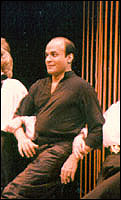Stephenville Theatre Festival
Maxim Mazumdar (originally from Bombay, India), was in Stephenville for the 1976 Provincial Drama Festival where he was adjudicator. Impressed with the caliber of performers from around the province and encouraged by local volunteers, Mazumdar decided that Stephenville was a good place for a yearly theatre festival. Mazumdar returned to Newfoundland in 1978 and, over the course of two years, he established the Provincial Drama Academy (a summer theatre school for high school students) and the Stephenville Festival. He hoped that the Academy and the Festival would provide performers with a place to learn about the theatre, to work with professionals, and practice their craft.

Opening
In 1979 the Stephenville Theatre Festival opened. Starting with only 5-6 people on payroll and a shoe-string budget, the Festival produced Macbeth and The Man Who Came to Dinner at the Arts and Culture Centre in Stephenville. He was able to seduce some internationally known performers into the town such as British ballet stars, playwright/critic Eric Bentley and high-profile actors from across the country.
The Stephenville Theatre Festival's content in its first decade was popular, and it still is for the most part. Mazumdar and company picked successful American Broadway musicals, classical theater (again, often American but also European), and even some of Mazumdar's own works. For example, in 1980, they produced Mazumdar's own piece Invitation to the Dance starring renowned dancer John Gilpin, and Tennessee Williams's The Glass Menagerie. That same year the Festival company went to the Edinburgh Theatre Festival. In 1984 they produced Cyrano de Bergerac starring Gordon Pinsent. The Festival ran for two weeks and the repertory schedule saw large audience attendance. Artists employed by the Festival also provided workshops to Academy students in acting, voice and movement.
Employing a Professional Company
By 1985 the Festival employed a professional company augmented by students from the Newfoundland Drama Academy, the Festival's summer school. Eight different productions ran every summer and attendance had grown to average 7,000. Working with Mazumdar was festival manager Cheryl Stagg, whose aggressive fund-raising drew both praise and criticism. Her courting of corporate sponsors was not entirely popular at a time when the performing arts in Canada often maintained a firm distance from big business. But Stagg's financial successes in the 1980s allowed Mazumdar to bring in nationally-known performers and to produce the kinds of plays he wanted.

Between 1984 and 1987, Mazumdar and his company took the Festival plays to Halifax and St. John's. By the late 1980s, however, attendance dropped and then in 1987 the Town of Stephenville cut a vital subsidy. Just months before the 10th Anniversary Festival season, founder Mazumdar died of AIDS-related complications.
Artistic Director Positions
In 1989, the new Artistic Director, Irish-born actor Sean Mulcahy, tried dropping the repertory approach and, unfortunately, the Festival went further into debt. Then, from 1990 to 1993, Cliff Le Jeune took on the task of Artistic Director. In his four years as Director, Le Jeune managed to expand the Festival and to address the budget deficit. Le Jeune would combine popular musical theatre, like Patsy Cline Idyll Gossip, with Newfoundland plays such as Janis Spence's Catlover, and Michael Cook's Therese's Creed. Le Jeune kept musical theatre as the core of the Festival, and he had a big hit with the popular musical Nunsense in 1992.
From 1994 to 1999 a former actor with Mazumdar's company, Edmund MacLean, took over as Artistic Director and consistently produced 10-12 plays each season, keeping the musicals, and classical theatre but expanding the Canadian and Newfoundland content. MacLean did not have an easy start. In 1994 the Festival announced that it was going to cancel the season, and then reversed the decision. MacLean produced a smaller, shorter program in 1994, and the Festival hung on. Under MacLean's leadership, the Stephenville Theatre Festival started to produce more Canadian drama and fewer Broadway-style musicals. In 1995, the Festival included Linda Griffith and Paul Thompson's Maggie and Pierre and MacLean started the "Brave New Works" portion of the Festival. This second space activity produced eight 20-minute scripts from local playwrights. MacLean's mandate was to produce light comedy and musicals as well as Canadian plays from both Newfoundland and the rest of the country.
Other Productions
In 1998 Friendly Invasion, based on the book of the same title by John Cardoulis was the main attraction. Based on Stephenville's history as the site of the Ernest Harmon Air Force Base, the play considers the complex relationship between Newfoundland and Labrador and the American military. Other productions have been Dracula, Plaza Suite and Roy Orbison - A Legend in His Time. The 1999 season included Tom Cahill's As Loved Our Fathers, David French's Salt Water Moon, and Cindy O'Neill's Woman of Labrador.
The Festival has been recognized for its continuing work in the theatre, receiving awards from the provincial and federal governments. The 2001 season, under Artistic Director Jerry Doyle, includes Munsch based on the popular children's writer Robert Munsch's stories, The Outlaws by Jerry Doyle, Clar Doyle's Out From Here, as well as musicals and fringe theatre events.
As of 2023 the Stephenville Theatre Festival remains the longest running festival in the province.




